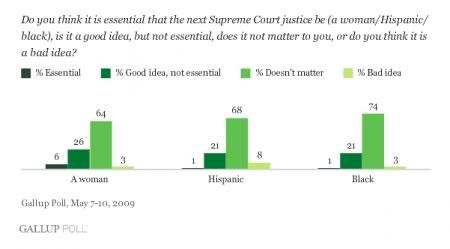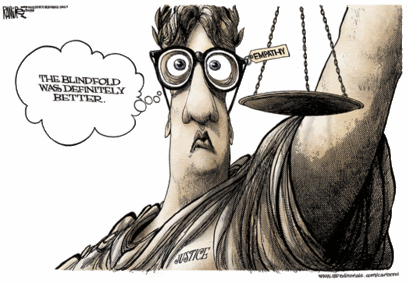The Committee for Justice has received a lot of queries about President Obama’s nomination of Sonia Sotomayor to the Supreme Court. Here are the most frequent questions, along with the answers of CFJ Executive Director Curt Levey.
Q: What is your reaction to the President’s choice?Having told colleagues that I thought President Obama was too smart to pick someone with as much baggage as Sonia Sotomayor, I was surprised to learn of her nomination. Many other people were surprised as well, given both the widespread expectation that Obama would choose an intellectual heavyweight and Obama’s own recent statement that he would not make gender or race the major factors in his selection. Liberal law professor Jonathan Turley summed it up well on MSNBC yesterday, expressing bewilderment that Obama chose Sotomayor when heavyweights like “[Seventh Circuit Judge] Diane Wood would have met all his criteria.”
The only plausible explanation for Sotomayor’s selection is that the President was boxed in by demands from Hispanic and women’s groups that he pick one of their own. What else could explain his choice of a nominee who presents such a big target for conservatives and so clearly forces red state Democratic senators to choose between the values of their constituents and those of the nominee? Among the more obvious sore points for moderate Democrats are Sotomayor’s controversial rulings on Second Amendment rights (
Maloney v. Cuomo), property rights (
Didden v. Village of Port Chester), and racial preferences (
Ricci v. DeStefano) – all issues that President Obama would love to avoid. With gay marriage sure to be a big issue no matter who he nominated, it is hard to believe that Obama would have chosen to focus attention on three more issues that cut the GOP’s way unless he felt backed into a corner.
Obama’s choice of one of the few federal judges with a bad record on
gun rights is particularly perplexing. Earlier this year, Sotomayor and two of her Second Circuit colleagues ruled that Americans have no individual Second Amendment rights in the face of state or local regulation of firearms – that is, unless they happen to live in the District of Columbia. Even the liberal Ninth Circuit ruled the other way. Now every red and purple state Democratic senator who considers voting for Sotomayor will be forced to explain to his constituents why he’s supporting a nominee who thinks those constituents don’t have Second Amendment rights. Because they can send red state Democrats running for cover, gun owners are the one interest group that could completely change the political equation on judicial nominations if they’re drawn into the debate. Obama’s selection of Sotomayor makes that virtually certain.
As
Ken Blackwell said yesterday,
“President Obama has nominated a radically anti-Second Amendment judge to be our newest Supreme Court justice. There are a number of pro-Second Amendment Democratic senators from deeply red states, including Mark Begich from Alaska, Jon Tester and Max Baucus from Montana, Ben Nelson from Nebraska, Byron Dorgan and Kent Conrad from North Dakota, and Tim Johnson from South Dakota. These senators will jeopardize their seats if they vote to support an anti-gun radical for the Supreme Court. … [N]ever underestimate the political power of American gun owners.”
Until yesterday, I held out hope that President Obama would nominate a moderate liberal to the Supreme Court. Perhaps it was naive to think that Obama would deviate from his pattern of speaking from the center but governing from the left. The bright side of his choice is that ensures a high-profile Supreme Court confirmation battle – the first over a Democratic nominee in many decades – thus providing Americans with the long-awaited opportunity for a national debate on the wisdom of judicial activism.
Q: Will Republican senators be afraid to oppose Sotomayor for fear of alienating Hispanics?I don’t think so. Should Democratic senators or their allies on the Left accuse Sotomayor’s critics of being anti-Hispanic, the accusers can be made to look foolish simply by reminding them that they vigorously opposed and successfully filibustered George W. Bush’s nomination of Miguel Estrada to the U.S. Court of Appeals for the D.C. Circuit. Democratic Judiciary Committee memos revealed that opposition to Estrada was based on concern that he would eventually become the first Hispanic Supreme Court Justice. And keep in mind that Estrada’s personal story is at least as compelling as Sotomayor’s. As a teenager, he came to the United States from Honduras speaking very little English.
Q: Is there a chance of stopping the confirmation of Sotomayor?In assessing the widely mentioned potential nominees over the last few weeks, I concluded that there were only two whose confirmation would be in doubt should they be nominated. One was Sonia Sotomayor. She clearly fails Democratic Sen. Ben Nelson’s “will they be an activist or not" test, but that’s not why I reached my conclusion. Sadly, even being a wild-eyed judicial activist is probably not enough, by itself, to stop a Supreme Court nominee given the large Democratic majority in the Senate. But as I learned during the Bush years, the best predictor of whether a controversial nominee can be stopped is whether the case against her is based on more than just her legal analysis. In Sotomayor’s case, there is quite a bit more.
First, there are the questions about Sotomayor’s temperament and intellect. Liberal law professor, author and Supreme Court expert
Jeffrey Rosen wrote earlier this month in the
New Republic that
“Over the past few weeks, I've been talking to a range of people who have worked with [Sotomayor], nearly all of them former law clerks for other judges on the Second Circuit or former federal prosecutors in New York. Most are Democrats … but nearly none of them raved about her. They expressed questions about her temperament, her judicial craftsmanship, and most of all, her ability to provide an intellectual counterweight to the conservative justices.”
Jonathan Turley, an equally liberal professor of law at George Washington University, reviewed Sotomayor’s opinions and concluded
“[Her opinions] are notable in one thing, in that it’s a lack of depth. There’s nothing particularly profound in her past decisions. … You can’t say she’s a natural choice for the Supreme Court.” (MSNBC, May 26, 2009)
In 2005, the last time a Supreme Court nominee was viewed as having less than a superstar intellect, the result was a withdrawal of her nomination before Judiciary Committee hearings could get under way. The fact that the President’s party had 55 seats in the Senate at the time was of no help to Harriet Miers.
Second, there are the intemperate statements Sotomayor has made. In 2005, Sotomayor made it clear that she wants judges to be policy makers rather than neutral interpreters of the law, despite knowing that it’s wrong.
Speaking at Duke University, she said
“[The] Court of appeals is where policy is made. I know this is on tape and I should never say that because we don’t make law I know. [Sotomayor and the audience laugh]”
Speaking at the University of California at Berkeley in 2001, Judge Sotomayor made it equally clear that she believes white males judges leave something to be desired:
"I would hope that a wise Latina woman with the richness of her experiences would more often than not reach a better conclusion [as a judge] than a white male who hasn't lived that life."
Imagine if Supreme Court nominees John Roberts or Samuel Alito had said the reverse. In any case, Sotomayor’s opinion of white males should surprise no one given her later ruling in
Ricci v. DeStefano that the results of promotion exams for New Haven firefighters – expertly designed to eliminate the possibility of racial bias – could be thrown out because white males did too well.
Third, the contempt for the rule of law revealed by Sotomayor’s remarks at Duke University were on display again in the
Ricci case, this time calling her judicial ethics into question. An
excellent piece by
National Journal columnist and former
New York Times Supreme Court reporter Stuart Taylor tells you all you need to know. Taylor explains that Sotomayor and her two 2nd Circuit colleagues engaged
“in a process so peculiar as to fan suspicions that some or all of the judges were embarrassed by the ugliness of the actions that they were blessing and were trying to sweep the case quietly under the rug, perhaps to avoid Supreme Court review or public criticism, or both. … The three-judge panel initially deep-sixed the firefighters’ appeal in a cursory, unpublished order that disclosed virtually nothing about the nature of the ideologically explosive case.”
That the Supreme Court will issue its decision in
Ricci next month – in the middle of her confirmation battle – is bad news for Sotomayor, because it will serve to increase the focus of senators and the media on the case. Worse yet for Sotomayor, the Court will almost surely reverse her ruling in the case, while perhaps scolding her and her two colleagues.
In sum, Sotomayor’s questionable intellect, temperament, ethics, and judgment mean that much more than just her legal analysis is in doubt. Based on past experience, that ensures that the confirmation process will be a bumpy one for the President’s nominee.



